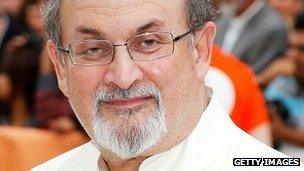Salman Rushdie: Satanic Verses 'would not be published today'
- Published
Salman Rushdie: "My view was and is that nothing is off limits"
Sir Salman Rushdie has said he does not think his 1988 novel The Satanic Verses would be published today because of a climate of "fear and nervousness".
The writer said the banning of his book in many countries and the subsequent threats on his life had created a "long-term chilling effect".
"A book which was critical of Islam would be difficult to be published now," he told the BBC's Will Gompertz.
He said the only way to solve the issue was for publishers to "be braver".
"The only way of living in a free society is to feel that you have the right to say and do stuff," he said.
Many Muslims regard The Satanic Verses as blasphemous, and the book is still banned in India.
The 65-year-old writer lived in hiding for many years after Iran's Ayatollah Khomeini issued a fatwa calling for his execution.
Sir Salman said writers were still being attacked for their works in the same way, in Muslim countries including Turkey, Egypt, Algeria and Iran.

Sir Salman said writers and publishers needed to 'be braver'
"If you look at the way in which free expression is being attacked by religious extremism, the things of which these people are accused is always the same - it's blasphemy, heresy, insult, offence - it's this medieval vocabulary.
"We're in a difficult place because there's a lot of fear and nervousness around."
He pointed out that, as recently as last week, Channel 4 had cancelled a screening of its documentary, Islam: The Untold Story, following security threats.
"The fact a documentary about Islam can be pulled because someone is worried about the consequences is an indication of that," he said.
However, the author said he noted that, on the 20th anniversary of the fatwa, many who had arranged protests against him told newspapers they thought their actions had been a mistake.
"Some of them seemed to accept the free speech argument and understood if they had the right to say what they felt, it was wrong to prevent people who felt differently from having their say," he said.
"If that's right, then maybe we can emerge from a climate of fear."
The writer is set to release his memoirs, entitled Joseph Anton - the name he used while in hiding, and a reference to his favourite authors Conrad and Chekhov - which tell of how he was forced underground in 1989 over his book.
- Published24 January 2012
- Published24 January 2012